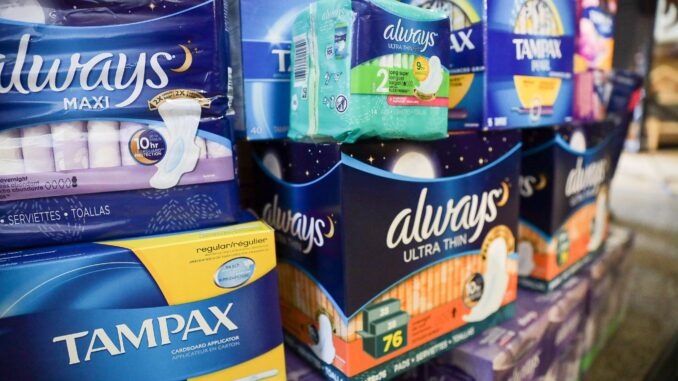
BY JADA SIMON
Out with the old and in with the new. A new state law will replace the terms “feminine hygiene products” and “sanitary napkins” with “menstrual products,” and will require private schools to provide the products to their middle and high school students.
“From simply updating the way certain products are referred to, to expanding access to vital resources for those who may need them most, as time progresses, so should our laws,” said New York State Governor Hochul. She signed the Health Equity and Opportunity Legislation on November 19, which includes expanding the availability of menstrual products.
This legislation is a milestone, according to Lacey Gero, the Director of Government Relations for the National Diaper Bank Network, a non-profit that started a program called the Alliance for Period Supplies. The program provides menstrual products to those who need them.
“We’re really excited because this is the first time that this has been done,” Gero said. “New York is the first state to actually require that non-public schools provide these products.” State Senator Roxanne J. Persaud said that changing the terminology from “feminine hygiene products” and “sanitary napkins” to “menstrual products” is a great way of sending the message that menstruation is normal.
“Outdated terminology perpetuates stigma surrounding menstruation, which ultimately discourages conversations that enable access to basic resources. This bill recognizes the simple reality that menstruation is not dirty, but rather a natural bodily function,” said Persaud. “In so doing, we take another step in lifting the stigma, combatting period poverty, and ensuring equal dignity for all individuals who menstruate throughout New York.”
Lack of access to period products often forces students to choose between their health and their education.
“25% of menstruating individuals do not have access to period products, which are a basic necessity that can be a burdensome expense for families. Without these products, students are likely to miss classes and school days,” said State Senator Iwen Chu. “I’m proud to see my legislation signed by Governor Hochul so non-public school students have menstrual products accessible to them and strengthening our fight against period poverty. Menstruation is not a choice, but removing the barrier to product access is.”
According to a Murrow Network article, Michelle Buow, a senior at Edward R. Murrow conducted a research project on the lack of menstrual products in the school’s bathroom and found that “almost 63% of female students said that the school lacks access to menstrual products.”
Baird Tenney, a student at Murrow, had an unfortunate experience where she bled through her pants in her junior year because she didn’t have any menstrual products. “It’s a preventable situation, which is why it’s so frustrating,” said Tenney in the article.
“It’s expensive and we know a lot of students can’t afford it which makes it so important for students to have access in school,” said Karen Susnitsky, a health teacher at Murrow.
“43 percent of students said that when they do not have access to menstrual products, they feel that they suffer academically,” said Buow.
Gero said that this legislation is a way of ensuring that every student whether from a public or private school is given the access they need to these products.
“New York is setting the precedent that all schools should really be providing these products,” Gero said.
